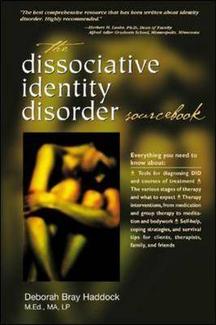Making Peace with a Dissociative Identity Disorder Diagnosis
I wrote the series, Diary of a Newly Diagnosed Dissociative, because I know I'm not the only one who has wrestled in turmoil over their Dissociative Identity Disorder diagnosis. I want those who are struggling to know that, within the context of DID, their experiences aren't as unusual as they probably feel. But knowing you're not alone, while helpful, won't ease the struggle too much if there's no end in sight. I can tell you, though, that making peace with this diagnosis is an attainable goal. I did it. These three things are what made it possible.
[caption id="attachment_1215" align="alignleft" width="240" caption="Photo by Michel Filion"] [/caption]
[/caption]
Time
It bothers me that so many mental health professionals spread the word that treatment for DID takes between three to seven years, when for many just accepting the diagnosis takes that long or longer. There are those rare few for whom the diagnosis is such a huge relief that making peace with it isn't that difficult. But it took me five years to come to terms with my Dissociative Identity Disorder diagnosis. And I'm part of the rule, not the exception.
 Education
Education
In hindsight, I can see that much of the distress I experienced in the aftermath of my Dissociative Identity Disorder diagnosis had roots in ignorance. The more I learned about DID, the less tied up in knots about it I felt. For those just beginning to learn, I recommend:
- The Dissociative Identity Disorder Sourcebook. Written by Deborah Bray Haddock, this book provides an accessible overview of the basics of dissociation and DID.
- Multiple Personality Disorder from the Inside Out. A collection of writings from people with DID, this book helped me enormously by allowing me to see that I wasn't alone. Edited by Barry Cohen, Esther Giller, and Lynn W.
- The Stranger in the Mirror. Written in part by Marlene Steinberg, originator of the SCID-D - a highly respected diagnostic tool for dissociative disorders - this book does an amazing job of both normalizing dissociation and illustrating the more pathological aspects of severe dissociative disorders.
- The International Society for the Study of Trauma and Dissociation. Start with the FAQs on dissociation for preliminary, authoritative information.
- The Sidran Institue. An excellent resource for articles, links, and support materials.
- HealthyPlace. Check out the Dissociative Disorders Community for more on the symptoms, causes, and treatments of dissociative disorders.
[caption id="attachment_1223" align="alignleft" width="231" caption="Photo by Robin Green"] [/caption]
[/caption]
A Willingness to Tolerate Ambiguity
Taking into account my own experience and what I've read and heard from others diagnosed with Dissociative Identity Disorder, I believe one of the best things anyone living with DID can do for themselves is make friends with uncertainty. Doubt is difficult, but it doesn't have to derail you. I'm able - most of the time - to consider DID and everything that goes along with it from a neutral, curious perspective rather than diving full tilt into figuring it out. And that, along with time and education, has made an enormous impact on my ability to both make peace with my diagnosis and live with DID.
Follow me on Twitter!
APA Reference
Gray, H.
(2010, December 16). Making Peace with a Dissociative Identity Disorder Diagnosis, HealthyPlace. Retrieved
on 2026, March 4 from https://www.healthyplace.com/blogs/dissociativeliving/2010/12/making-peace-with-a-dissociative-identity-disorder-diagnosis
Author: Holly Gray
I have recently been diagnosed with DID for the second time. I didn't really believe the first therapist who diagnosed me, but now that a new therapist has said the same thing, I feel like I need to accept that it is a possibility. I feel like my symptoms are not dramatic enough to warrant the diagnosis. I don't know how I can know for sure, and I am feeling very confused. The articles on this site have been a valuable resource. I still don't know what to think about my diagnosis, but perhaps that is normal for some people. Thank you for writing.
While this is almost 3 years later. It was hard for me as well to accept it as a real possibility but I knew deep down that it had to be something going on. So I researched the crap out of it I also had a second opinion like you because it was so out of ordinary and all. I have accepted it for what it is and try not to look back at the day I was diagnosed. Here I am today about 8 years later. Still alive trying to live a "normal" life. This is off topic but I really want someone to make a different movie about the condition unlike the fake movie split, while it was entertaining it didn't really show the true condition as it is. I recently just switched jobs and had to mention the condition to my supervisor. Their reply was: "What! You mean like that movie? No way that's not real, quit pulling my leg." It ticked me off so much, that I had to walk away.
Hello Holly,
I am writing from Queensland, Australia. I just wanted to introduce myself, and let you know I have been reading on your site for a few months, and I have been greatly encouaged. Thank You!! I'll write some more when I am sure I have submitted this message accurately - this is my first time using a message like this!!
Melody
What's really strange is that it still shocks me as an adult every time I recall my history. I mean how many times do I have to be told? My brain is so stubborn it's ridiculous. The only reason I was diagnosed so young is because I kept forgetting my birth name and this distressed me so much that I walked around constantly asking people what my name was. At first they thought I was just playing some sort of game but eventually they realized something was wrong with me. I would wake up in the morning and have no idea who's room I was in even though pictures of me were around. It was a terrifying feeling. Despite all of their faults, my family did seek treatment for me which is the only reason I have a relationship with them today. I guess what I want to say is that no one should reflect too long on how different their lives could have been if they had been diagnosed earlier and had all those years to work on healing. For me it made no difference. Time and again I would "backslide" and let my denying and repressing alters have their way. Hopefully I am at the end of that part of the journey and can finally learn to just accept it already. Denial is a beautiful luxury I just can't afford anymore. Wishing you a peaceful and merry christmas Holly!
Hi Carla,
"I guess what I want to say is that no one should reflect too long on how different their lives could have been if they had been diagnosed earlier and had all those years to work on healing. For me it made no difference."
Thank you for sharing that. It's easy to get caught up in the what if's. Your experience reaffirms my suspicion that one of the main difficulties in accepting this diagnosis is the nature of dissociation itself - it keeps you from being aware of the whole of your reality, so noticing clear signs of the disorder is extremely difficult.
I hope you had a wonderful Christmas holiday, Carla
I was diagnosed with DID when I was a child, which was well over 30 years ago. In and out of therapy. Accepting then rejecting. It's hard to be told you have a mental illness when you are so young and by the time I hit my teen years, forget it. I wanted nothing to do with being associated with such a thing. I was determined to have a life and did not want to hear that there could be any kind of limitations for me. That only worked for so long though and here I am again, right back in therapy. I think it is great that so many people here are finding acceptance earlier than I did even if it feels like it's taking forever. It takes as long as it takes.
Hi Carla,
I can't imagine what it would be like to grow up with a diagnosis like DID. You must have a unique perspective. It's interesting to me that the diagnosis was just as difficult for you to come to terms with, if not more, than people for whom it comes as a shock in adulthood. I think, ultimately, it's just hard to learn that you have a diagnosable mental illness.
"I was determined to have a life and did not want to hear that there could be any kind of limitations for me."
I really relate to that. I still feel that way.
Thanks, Carla.
Thanks Holly. I agree: time and education are key for any condition, including DID and DD-NOS. But, perhaps moreso time for the dissociative disorders because it's such a learning process. A lot of other mental conditions are more chemical issues, so it's another matter somewhat. I see DID as being a condition which places all the responsibility on us. We have to do the work to heal. And everyone eventually realizes that the work is really hard and long. It's not for the faint of heart. Along the way you have to learn a lot of things. One of them is uncertainty. This, I have found, is something that is really at the core of what healing from a dissociative disorder is all about. If you can get to that place, then there is a huge light at the end of the tunnel.
Hi Paul,
"I see DID as being a condition which places all the responsibility on us. We have to do the work to heal."
I agree. And I also 100% agree that making friends with uncertainty opens healing possibilities up. It's counter-intuitive, but I've found that embracing ambiguity does truly allow me to see light at the end of the tunnel.
Thanks so much for your comment, Paul.
I was diagnozed with DID in 1997 and lived dissociativley for the next seven years only to come out of my dissociation with a complete physical and mental breakdown and i have only been actively working on my recovery for about three years, although i have been with the same psychologist siince 1992 where i was in and out of dissociation until the diagnosis in 1997. It helps to know others are out there, but i do not know if i am now cutting off my inner ones by denial or rather am i becoming to the point where they are no longer needed. seeing as it took the greater part of my life in abuse, it seems that spending three years where i actively am involved in my own recovery is so little.
I agree Holly... time and education are so important. When I get frustrated with how long I've been in therapy, my therapist reminds me that the time spent in healing is a drop in the bucket in comparison to how long I was hurt, and that I'm worth the time. The second part of her rebuttal is often difficult to accept.
Take care,
CG
Holly, the work you are doing here is outstanding.....and so appreciated.
A little over a month ago, I found myself struggling with my diagnosis while having no one to communicate with besides my therapist. I stumbled across your blog, and was immediately intrigued with the extensive research that you have done on Dissociative Identity Disorder. Your intellectual way of expressing what so many of us go through intrigued me even more. I eventually gained the courage to respond to one of your posts. Then I found myself responding to another, and another. For the first time, I felt safe in a community of people who understand this diagnosis.
I also discovered that you have supporters here who have wonderful blogs of their own, and it makes me feel great that you all support each other.
On what you said above about the time table that many health care professionals give to the treatment of DID.....I couldn't agree more. This has been baffling to me, as it has taken me so many years just to accept the diagnosis of DID, just as it did for you.
I also love your comment above about making friends with uncertainty. That is something I definitely need to work on. :)
Over the summer I read Stranger in the Mirror. I am now finally starting to read The Dissociative Identity Disorder Sourcebook. I know that you highly recommend this book, as well as a few other people who regularly comment here on your blog.
Thanks once again, Holly, for giving me someplace to feel safe. All that you went through when you were newly diagnosed reminds me so much of myself.
I look forward to following your blog, and I hope one day I will have your strength, courage, and bravery.
--Mareeya
Hi Mareeya,
"For the first time, I felt safe in a community of people who understand this diagnosis."
I wish there were more safe places, but I am thrilled that HealthyPlace has become one for you, Mareeya. In my experience, and based on what I've heard from others, just having a few people to dialogue with in a supportive, empathetic way can make an enormous difference. Dissociative Identity Disorder on its own is isolating and confusing enough. Having no one to talk to, no one who understands, just makes it so much worse.
"I look forward to following your blog, and I hope one day I will have your strength, courage, and bravery."
I suspect you already do. :)
I'm glad you're here, Mareeya.
Holly~
I want you to know that I/we REALLY appreciate your blog. We have identified with so much that you've written and have found your sharing VERY helpful and encouraging. Thank-you and please keep being real like you have been.
Hi chariots,
Thank you for your lovely comment. I wrote it out on a Post-It and stuck it next to my laptop! Encouragement on the go .... :)
Holly
This was really well written and thought out. So much more is out there now to help folks just learning about DID, this is one of them.
Ravin
Hi Ravin,
Thank you, truly. It really means a lot to me.
Hey Holly,
What a great, informative article with so many wonderful resources given and the many easy links to get further info on! Love your title "Making Peace ...".
You're doing a fantastic job of informing others about DID, and this site in general educates about so many mental health issues from a first hand perspective. Keep up the great work!
Take care, Barb
Hi Barb!
Wow, thanks so much for stopping by. I really appreciate the vote of confidence. Thank you.